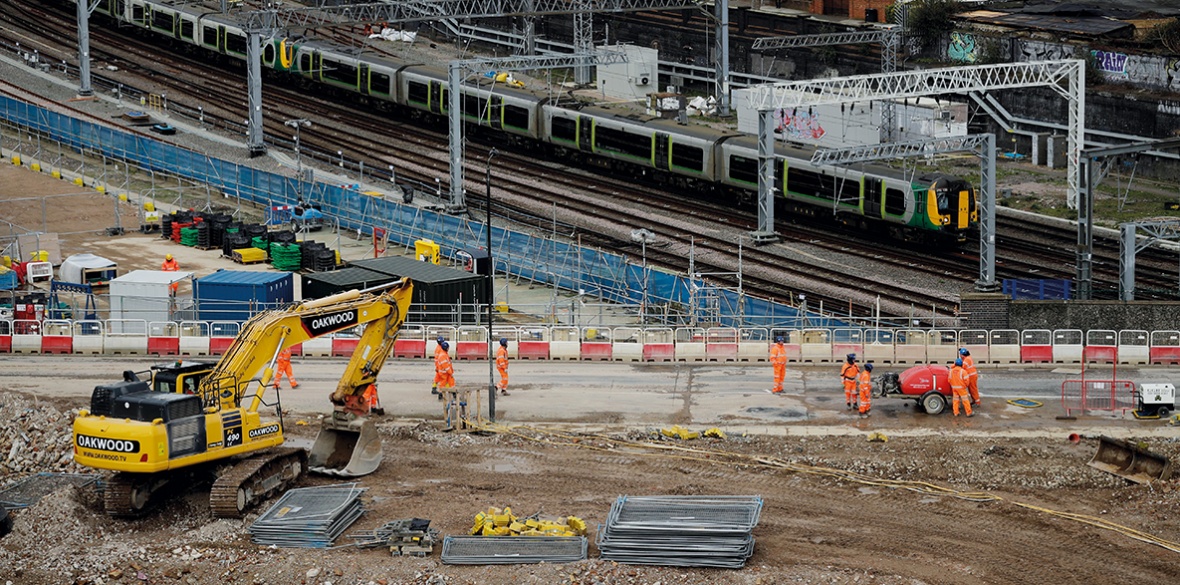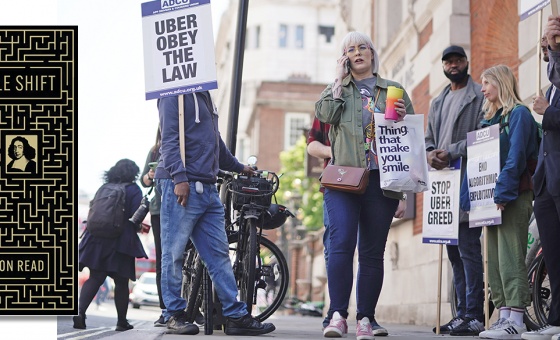This is the last article you can read this month
You can read more article this month
You can read more articles this month
Sorry your limit is up for this month
Reset on:
Please help support the Morning Star by subscribing here
CONTEMPLATING the sad stump of HS2 — as this is written the cancellation of its remaining northern leg looks inevitable — I recall a conversation I had with the great Marxist economist David Harvey a few years ago.
He was describing how he would visit a district in China and find it more-or-less a wilderness and then return maybe four years later to see it full of factories, housing developments and the most modern infrastructure, including high-speed rail lines.
I asked how the Chinese government was able to accomplish this and his answer stuck with me: “Property rights are not a problem.”
So to the story of the high-speed line from London to Manchester, which would be 14 years in the making if only something had actually been made. It now seems that among the places the rail link will not connect with are London and Manchester, Leeds having already been taken off the timetable by Boris Johnson.
It is true that if the line terminates at Old Oak Common, as is now mooted, disembarking passengers will in fact be within Greater London. But unless they are visiting family in Acton or have business in Willesden they will not be where they want to be.
It is convenient only for prisoners fleeing HMP Wormwood Scrubs nearby.
And it remains an incongruity that HS2 will never connect with HS1, the line from London to the continent. Passengers from Birmingham or Manchester wishing to proceed onwards to Paris or Brussels would have to walk a few hundred yards along Euston Road, if they ever get that far, before reboarding another high-speed train at St Pancras station.
Connecting the two would be too expensive, some Tory transport minister or other decided years ago.
It is right and proper to ridicule the Tories for this Olympic-standard fiasco. But that is not the root of the problem.
One forlorn HS2 manager put his finger on it, telling the Guardian that the project’s epic cost over-runs are just the price “of building infrastructure in an island crammed with private property.”
A large part of the expense and delay is down to compensating property owners along, or within earshot of, the line’s putative route. That alone has cost billions.
You can still claim compensation if your property is affected by the line to Manchester that will not exist for the foreseeable future. Hundreds of millions have been paid to owners on or near the line to Leeds which never left the drawing board, quite literally.
Apparently, no-one finds this odd. Of course, if your home is to be destroyed by a project like HS2 you have every right to be rehoused in comparable property as nearby as possible.
But that is not the case for the great majority of property owners demanding cash. They are claiming that the market value of their property may decline because of the proximity of a railway.
That is to say, the use value of their property will remain more or less unimpaired. Public funds are instead deployed to maintain their exchange value.
Even greater sums have been spent by HS2 on dealing with planning issues along the route. These have become a phenomenal cost for any infrastructure development.
For example, the planning application alone for a new crossing of the Thames estuary has cost £267 million.
Some planning requirements, relating to environmental protection for instance, are surely worthy. But more of this again is about protecting local property values. “Nimbyism” is driven by endangered bank accounts rather than endangered wildlife.
Thus most of the London to Birmingham route is going to be in very expensive and unnecessary tunnels, which would only appeal to the traveller who enjoys commuting on London’s Northern Line.
Private property has stood watchful guard over many much greater social evils — slavery, to take one example. Its abolition was delayed for decades over concerns about the rights of the property owners, who were lavishly compensated, rather than the property, who were not.
Railway construction has its own history. When the initial mainlines arrived in Victorian London tens of thousands of workers were evicted from their homes that stood in the way. They were driven out while their landlords were bought out.
Such assertions of private property rights are not aberrations. They are foundational to the capitalist system and its hegemonic ideology, liberalism.
There is a debate to be had as to how much personal property might be acceptable in a socialist society, just as there may be as to the appropriate balance between general and local interests in planning decisions. Both are given weight in China I am sure, but in the end, the general interest must prevail.
Property rights represent the private appropriation of part of the social wealth, and invert the relationship between the individual and the common good.
That is the larger meaning of the wasteland now created next to Euston station, where work on the original HS2 terminus has ceased. Absent any better idea, let a monument to the abusive power of private property, and its domination over society, be erected in its midst.
Bomb thy neighbour?
GOD may move in mysterious ways, but the movements of shadow foreign secretary David Lammy are more mysterious still.
Lammy last week declared his own and Labour’s “unshakeable commitment” to Britain’s nuclear weapons arsenal.
This is the same Lammy who in 2016 told MPs that he could not vote to renew the Trident nuclear missiles programme because of his Christian faith. “I stand here first and foremost as a Christian, and I speak from that perspective… nuclear weapons contradict religious principles,” particularly the principle of loving thy neighbour, he said on that occasion.
Now, according to Lammy, thy neighbour must be prepared for mass destruction. God has had a change of heart, perhaps? Or is the shadow foreign secretary “first and foremost” a fraud, as were the scribes and Pharisees who neglected “justice, mercy and faithfulness” and therefore “shall receive the greater damnation” (Matthew: 23)?
This atheist is voting damnation.
Nagorno-Karabakh tragedy is rooted in the Soviet break-up
Events in Nagorno-Karabakh are a measureless tragedy. As more than 100,000 Armenians flee Azerbaijan, it looks like a successful example of ethnic cleansing.
It is striking, however, how few pundits join the Soviet dots. Armenians and Azerbaijanis seemed to get along well enough in the USSR, which was a socialist and not an imperial project.
However, as in Ukraine, there were any number of border discrepancies in Soviet internal administration, which mattered little at the time but have left millions of people feeling they live in the “wrong” successor state.
That underlies the Nagorno-Karabakh conflict and is a major factor in the Ukraine war too.
Yeltsin and his counterparts in other republics dissolved the Soviet Union in haste, eager to grab power for themselves when sense and decency demanded at least a pause, if the state could not be saved, to negotiate borders democratically.
Millions of people are still paying the price.











